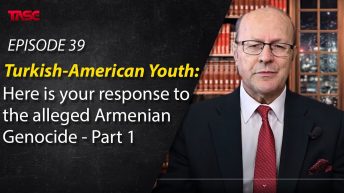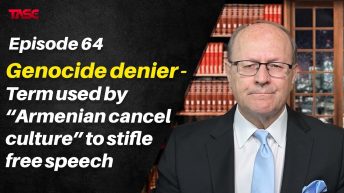n Episode 50, Boghos Nubar Pasha’s letters to the French government in 1918 and then to the London Times in 1919 told us that the Armenians have been, since the beginning of the war, ‘de facto belligerents’ as they have fought alongside the Allies on all fronts.
In Palestine and Syria, Nubar said, the Armenian volunteers, played a large role in the victory of General Allenby. And in the Caucasus, 150,000 Armenians in the Imperial Russian Army and more than more than 50,000 of Ottoman-Armenian volunteers contributed to the Ottoman Empire’s loss of a great portion of Eastern Anatolia. While Nubar was revealing these facts, he was striving for a place at the Paris Peace Conference table. Little did he know that they would amount to a massive Armenian confession, that the Armenian suffering was not due to a systematic extermination campaign by the Ottoman government, but due to the treasonable acts of most Ottoman-Armenians such as revolts, terrorism, and joining the invading enemy armies.
These two Nubar letters sum up why the Ottomans, who were fighting for their survival on many fronts, while also combatting a widespread Armenian insurgency at home, had to remove out of the war zones the Armenian rebels and their logistic base. In Episodes 51 and 52, another major Armenian confession was explored, that of the first prime minister of Armenia, in the book “The Armenian Revolutionary Federation Has Nothing To Do Any More, The Manifesto of Hovannes Katchznouni.
He wrote “…We had no doubt that the war would end with the complete victory of the Allies; Turkey would be defeated and dismembered…” Katchznouni described how the Armenians had created a dense atmosphere of illusion in their minds and lost their sense of reality. He confessed that the struggle (that) had begun decades ago against the Turkish government brought about the deportation of the Armenian people in Turkey– which is what I pointed out all along.
Then in Episode 54, I analyzed the third massive confession, the one by the Armenian author K. S. Papazian in his book “Patriotism Perverted.” This 79-page book, published in Boston in 1934, reveals the hate crimes of the ARF and is dedicated to the Armenian victims of Dashnak terrorism. Papazian’s book, exposes the true nature of the Dashnaks as murderous ones who have caused much destruction to those whom the ARF has regarded as ARF’s enemies, as well as the Armenian people themselves. Papazian maintains that by committing senseless violence against Muslims, the ARF deliberately exposed innocent Armenians to retaliatory massacres. Aggravated by the ARF’s culture of profiteering and corruption, famine and disease claimed the lives of hundreds of thousands of Armenians in the Armenia in 1914-1920 period.
The power-hungry Dashnaks’ greed, arrogance, and ineptness in starting seditious wars in quick succession has a lot to do with huge losses of life and property, while the country had thousands of ills that needed attention. A hopeless revolt against the Soviets in 1922 which, according to Papazian, led to the deaths of tens of thousands of Armenian lives. In Episode 55, I shared with you perhaps the most shocking of all Armenian confessions, the one by the ARF in their book called Houshamatyan of the Armenian Revolutionary Federation, Centennial, Volume I, published in Glendale in 2006. In it, the ARF tells you how great fighters Armenians were, where they smuggled arms into the Ottoman Empire, how attacked Turks and killed Turks, and who were in what Armenian gang. A far cry from the “poor, starving Armenians” cliché, isn’t it? This might also explain why the Armenians archives of the period are closed. Turkish archives, on the other hand, are wide open under a single roof, in their purpose-built modern facilities in Istanbul, since mid-1980s.
A question begs to be asked: If the Armenians are so right in their long-discredited political claim of genocide, why would they not open their archives, like Turks did? What are Armenians afraid of? Perhaps they fear the world might see all the smoking guns behind heinous Armenian hate crimes, their instigators, financiers, manipulators, and perpetrators, as well as their extensions in the missionary establishment, among the Western diplomats, politicians, journalists. The world would be shocked to realize how scheming and cruel the ARF is. The book Houshamatyan is only a modest sneak preview of things to come. The title itself is a dead giveaway: Houshamatyan of the Armenian Revolutionary Federation, Centennial, Album-Atlas, Volume I, Epic Battles, 1890-1914. Epic battles? Whatever happened to unarmed, non-combatant, loyal angelic Christian subjects of the Ottoman Empire? Evidently, there is another side to the Turkish-Armenian conflict that went untold. And ARF is the one who is finally doing the telling.




Add comment